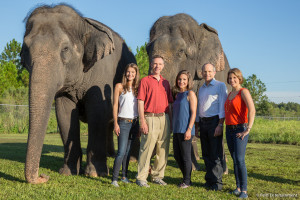 Animal Science
Animal Science  No Comments
No Comments Fighting Cancer with Elephants
Thanks to the recent study published by Pediatric Oncologist, Dr. Joshua Schiffman and his colleagues, the elephant’s resistance to cancer, and how it may be applied to humans has been in the news a lot recently:
Of the nearly 650 elephants analyzed, Schiffman’s team found that only about 5% died from cancer. That’s an incredible statistic, considering the cancer mortality rate in humans ranges from 11% to 25%.
This is some fascinating stuff, and what you might not know is the role the Ringling Bros. Center for Elephant Conservation (CET) is playing in this exciting research. Check this out:
Instrumental to this research is elephant DNA, and Dr. Schiffman needed a diverse gene pool to effectively study to species. Because the CEC has the largest herd of Asian elephants in the Western Hemisphere, the Feld Family felt compelled to help support this research. The incredible bond the staff has with these majestic animals, and the hands-on care provided at the Center for Elephant Conservation, allows the experts at the CEC to easily provide the blood samples Dr. Schiffman needs to further his research.
Dr. Dennis Schmitt, Ringling Bros. and Barnum & Bailey® Chair of Veterinary Services and Director of Research, and Dr. Wendy Kiso, Ringling Bros. Center for Elephant Conservation Research and Conservation Scientist, and other scientific collaborators on their team, have identified a key genetic link, called P53, that helps to protect both Asian and African elephants from developing cancer. The P53 gene’s job is to make sure that none of the cells in the body develop cancer. By studying the DNA in blood from elephants and the DNA in blood from patients with cancer, the team discovered that elephants have 40 copies of this P53 gene that attacks cancer while a healthy person has two copies.
Very cool findings! As humans work to preserve these majestic animals, will they in turn provide us with important keys in the battle against cancer? That would be certainly be poetic.
Oh — and by the way, Dr. Wendy Kiso will be presenting on the challenges and opportunities in saving the Asian Elephant at this year’s NAIA conference, in case you haven’t signed up already!

